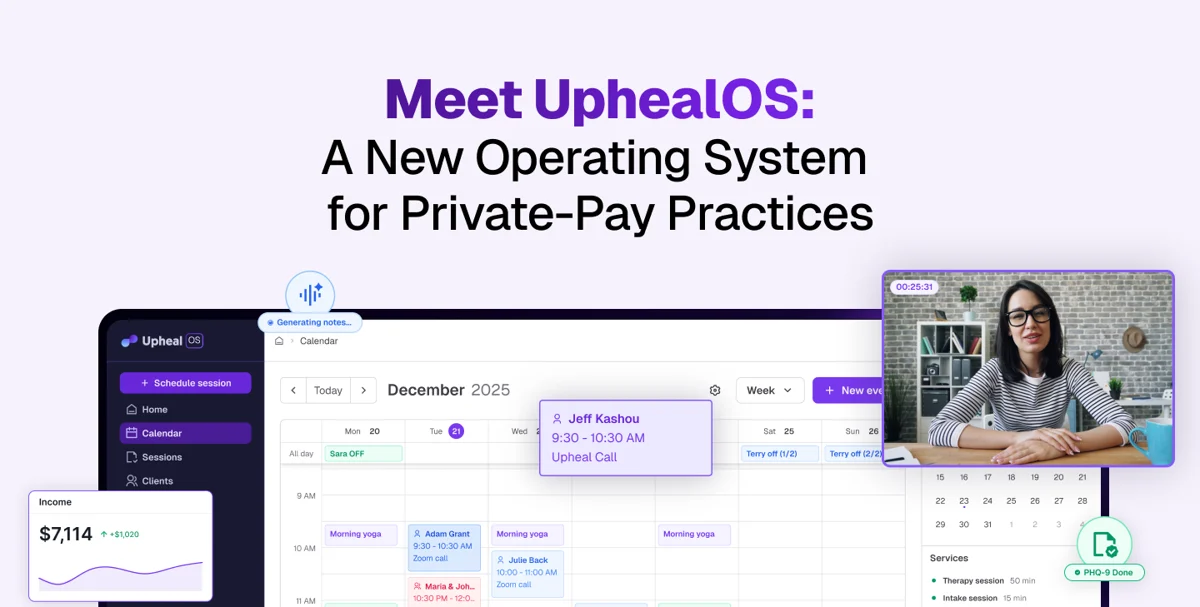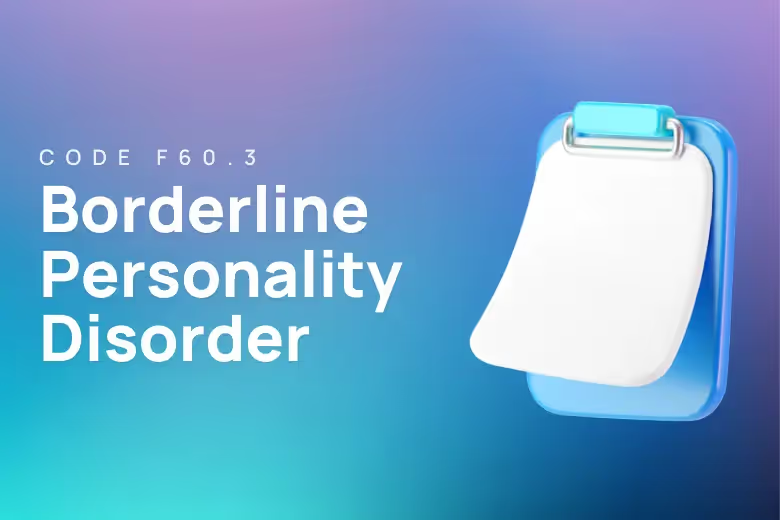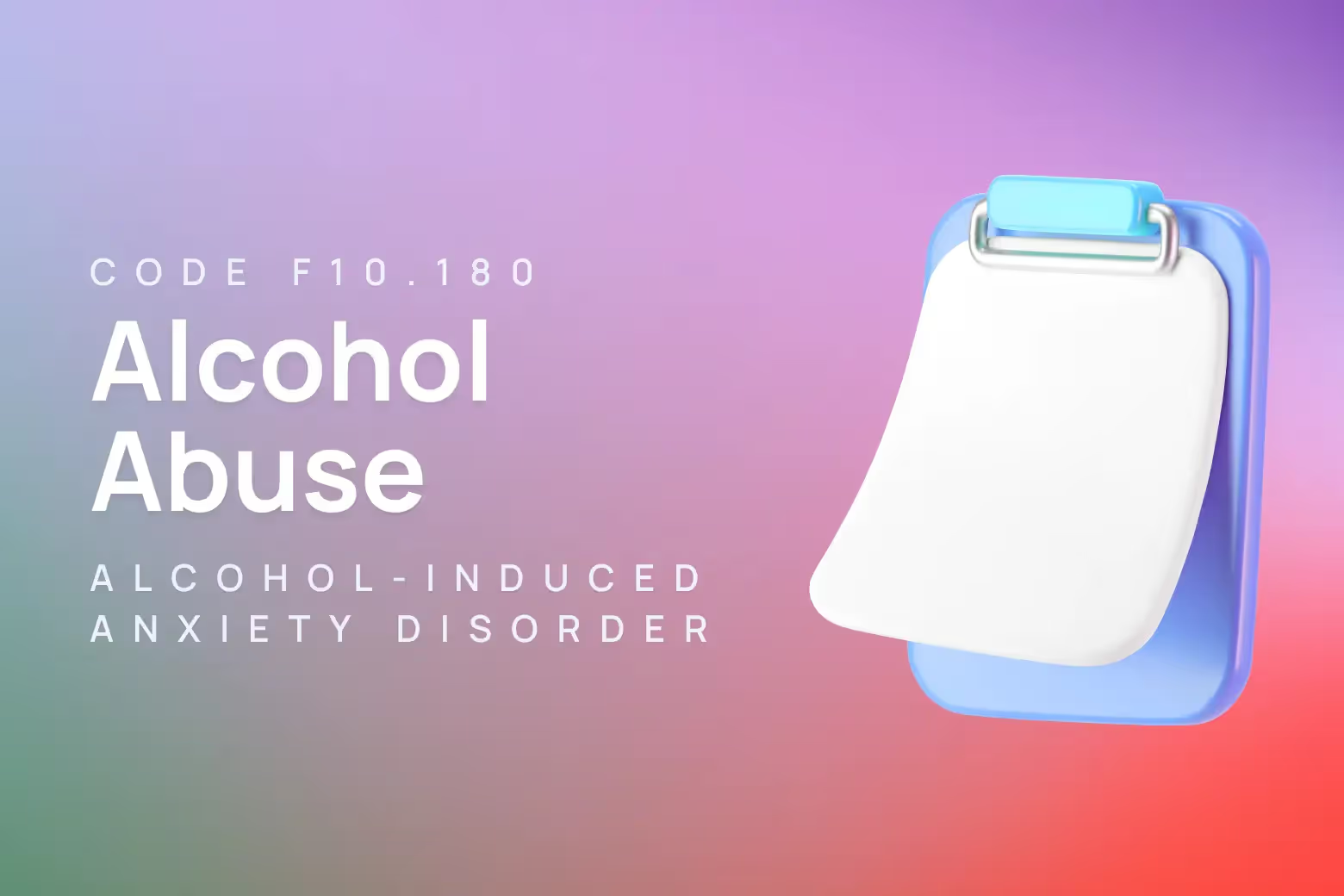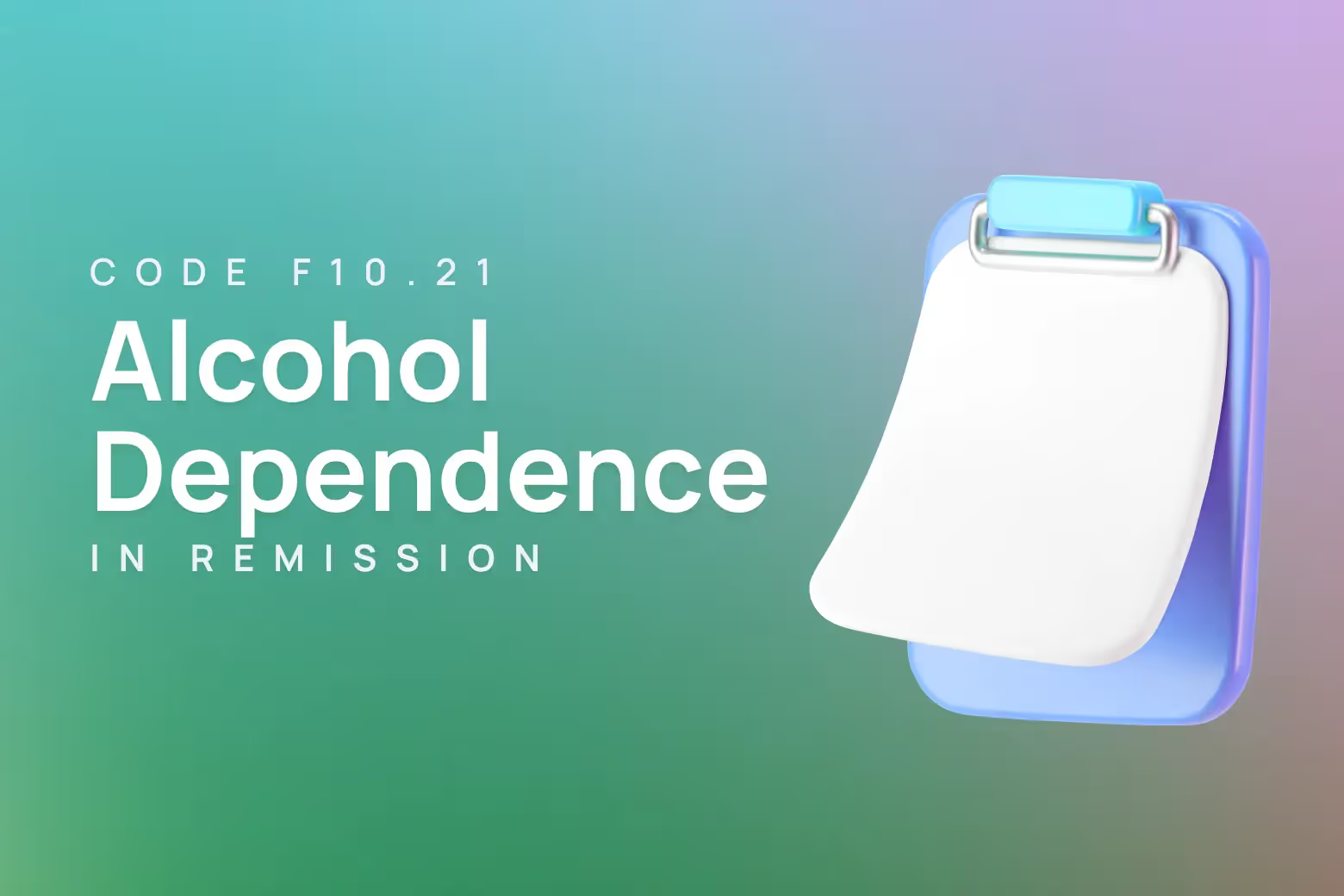ICD-10 code for alcohol dependence with alcohol-induced anxiety disorder

F10.280 is the ICD-10 code for alcohol dependence with alcohol-induced anxiety disorder.
This code captures a dual diagnosis where clients meet criteria for alcohol use disorder alongside anxiety symptoms directly caused by their alcohol consumption patterns.
Accurate diagnosis of this complex presentation requires careful assessment to distinguish between alcohol-induced anxiety and independent anxiety disorders that may co-occur with drinking problems.
Key features:
- Represents alcohol dependence combined with anxiety symptoms caused by alcohol use
- Requires meeting full criteria for alcohol use disorder plus evidence of alcohol-induced anxiety
- Distinguished from co-occurring independent anxiety disorders through temporal relationships
- Treatment approaches must address both the underlying alcohol dependence and associated anxiety symptoms

Diagnostic criteria for alcohol dependence with alcohol-induced anxiety disorder (F10.280)
Clients receiving this diagnosis must first meet the established criteria for alcohol use disorder. The foundation involves a problematic pattern of alcohol consumption that produces significant impairment or distress within a twelve-month timeframe.
Core alcohol use disorder symptoms include:
- persistent unsuccessful attempts to reduce drinking
- excessive time spent obtaining or recovering from alcohol
- continued use despite clear negative consequences
Additional indicators encompass tolerance requiring increased amounts for desired effects, withdrawal symptoms when stopping, and alcohol taking priority over important life activities.
The anxiety component of F10.280 specifically refers to anxiety symptoms that develop as a direct result of alcohol consumption or withdrawal. These symptoms must have a clear temporal relationship to drinking patterns rather than representing an independent anxiety disorder.
Diagnostic requirements for F10.280:
- At least two alcohol use disorder criteria met within 12 months
- Evidence of alcohol-induced anxiety symptoms with clear causal relationship
- Anxiety symptoms occurring during intoxication, withdrawal, or within one month of stopping alcohol
- Symptoms causing clinically significant distress or functional impairment
- Anxiety presentation not better explained by independent anxiety disorder
- Clear temporal pattern linking anxiety episodes to alcohol use or cessation
When to use F10.280 diagnosis code
Distinguishing alcohol-induced anxiety from co-occurring anxiety disorders represents one of the most challenging aspects of dual diagnosis assessment.
The key lies in establishing clear temporal relationships between drinking patterns and anxiety symptoms.
F10.280 vs F10.20 (Alcohol dependence, moderate to severe)
Choose F10.280 when anxiety symptoms have a demonstrable connection to alcohol consumption patterns.
This code applies when clients experience heightened anxiety during withdrawal periods, increased worry during drinking episodes, or panic symptoms that coincide with intoxication cycles.
The anxiety must directly result from alcohol's neurochemical effects rather than representing a separate condition.
Standard alcohol dependence codes (F10.20) are appropriate when anxiety symptoms either preceded alcohol problems or persist during extended abstinence periods. Independent anxiety disorders maintain their own symptom patterns regardless of drinking status.
F10.280 vs F41.9 (Anxiety disorder, unspecified)
Primary anxiety disorders coded under F41.9 have their own maintaining processes independent of substance use.
These conditions typically developed before alcohol problems began or continue unchanged during periods of sobriety. Clients with primary anxiety disorders may use alcohol as self-medication, but the anxiety itself has separate underlying causes.
F10.280 applies when anxiety symptoms emerge specifically in response to alcohol's direct effects on brain chemistry and neurotransmitter systems.
Related ICD-10 codes
- F10.28 - Alcohol dependence with other alcohol-induced disorders
- F10.281 - Alcohol dependence with alcohol-induced sexual dysfunction
- F10.282 - Alcohol dependence with alcohol-induced sleep disorder
- F10.288 - Alcohol dependence with other alcohol-induced disorder
- F10.20 - Alcohol dependence, moderate to severe
- F41.9 - Anxiety disorder, unspecified
Interventions and CPT codes for alcohol dependence with alcohol-induced anxiety disorder
Motivational interviewing approaches
Motivational interviewing serves as an excellent first-line intervention for clients ambivalent about addressing their drinking.
This collaborative approach helps clients explore their own reasons for change rather than imposing external pressure.
The technique proves particularly valuable when clients feel defensive about their alcohol use or uncertain about treatment goals.
Relevant CPT codes:
- 90832 (30-minute psychotherapy)
- 90834 (45-minute psychotherapy)
- 90837 (60-minute psychotherapy)
Cognitive behavioral therapy interventions
Cognitive behavioral therapy addresses both the alcohol dependence and associated anxiety through skills-based approaches.
Treatment focuses on identifying triggers for both drinking and anxiety, developing effective coping strategies, and modifying thought patterns that contribute to both conditions.
CBT helps clients recognize the connection between their drinking and anxiety symptoms while building alternative responses.
Relevant CPT codes:
- 90834 (individual CBT)
- 90837 (extended individual sessions)
- 90853 (group therapy)
Integrated treatment approaches
Combined interventions that simultaneously target alcohol dependence and anxiety symptoms show particular promise.
These approaches recognize that treating one condition without addressing the other often leads to incomplete recovery.
Integrated treatment helps clients understand how their drinking perpetuates anxiety cycles while building comprehensive recovery skills.
Relevant CPT codes:
- 90791 (psychiatric diagnostic evaluation)
- 90834 (integrated psychotherapy)
- 90846 (family therapy without patient)
Screening and brief intervention services
Structured screening combined with brief counseling interventions can effectively identify problematic drinking patterns and associated anxiety symptoms.
These approaches work well in various healthcare settings and help connect clients to appropriate treatment resources.
Relevant CPT codes:
- 99408 (SBIRT 15-30 minutes)
- 99409 (SBIRT over 30 minutes)
- G0396 (Medicare assessment and brief intervention)
- H0049/H0050 (Medicaid screening and brief intervention)
How Upheal improves F10.280 ICD-10 documentation
Suggesting appropriate ICD-10 codes based on session content
Upheal's clinical documentation platform analyzes session notes and client presentations to recommend accurate diagnostic codes.
The system recognizes patterns indicating alcohol-induced anxiety versus independent anxiety disorders, helping clinicians make more precise diagnostic decisions.
This capability proves especially valuable for complex presentations like F10.280 where temporal relationships between symptoms matter significantly.
The platform identifies key phrases and symptom descriptions that support alcohol-induced anxiety diagnoses, reducing the likelihood of coding errors that could affect treatment planning and reimbursement.
Maintaining HIPAA-compliant records with proper diagnostic coding
Comprehensive documentation requirements for dual diagnosis cases can overwhelm busy clinicians.
Upheal automatically generates detailed progress notes that capture both alcohol dependence symptoms and associated anxiety presentations while maintaining all privacy protections.
The platform ensures that diagnostic reasoning and temporal relationships between drinking and anxiety symptoms are properly documented, supporting the rationale for F10.280 coding decisions.
Reducing administrative burden so you can focus on client care
Complex cases involving alcohol-induced anxiety disorders require extensive documentation to justify treatment approaches and diagnostic decisions.
Upheal handles the administrative aspects of record-keeping, allowing clinicians to concentrate on building therapeutic relationships and delivering effective interventions.
Automated documentation features capture the nuanced clinical reasoning required for accurate F10.280 diagnosis while reducing time spent on paperwork after sessions.
Supporting clients with alcohol dependence and alcohol-induced anxiety disorder
Clients with F10.280 diagnoses often struggle with the interconnected nature of their alcohol dependence and anxiety symptoms.
Many discover that alcohol temporarily reduces anxiety but ultimately creates greater distress through withdrawal effects and life consequences. This cycle can feel overwhelming and hopeless without proper clinical support.
Treatment success requires helping clients understand the relationship between their drinking and anxiety while building alternative coping mechanisms.
Evidence-based approaches like motivational interviewing and cognitive behavioral therapy prove most effective when adapted to address both conditions simultaneously.
Long-term recovery involves developing anxiety management skills that don't rely on alcohol, addressing underlying trauma or stressors that contribute to both conditions, and building sustainable lifestyle changes that support ongoing sobriety.
With appropriate treatment and support, clients can break the cycle of alcohol-induced anxiety and achieve lasting recovery.
Upheal's clinical documentation platform helps clinicians provide better care for complex cases like F10.280 by ensuring accurate diagnosis, comprehensive treatment planning, and detailed progress tracking.
Learn more about how Upheal can improve your practice's clinical documentation.













